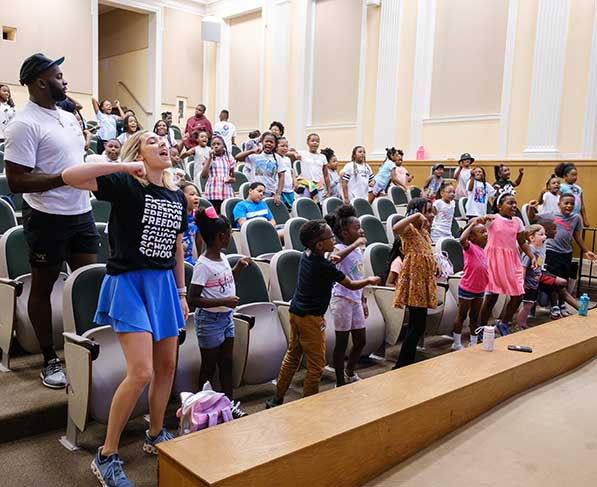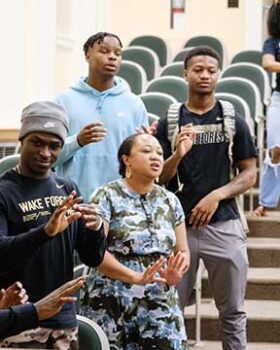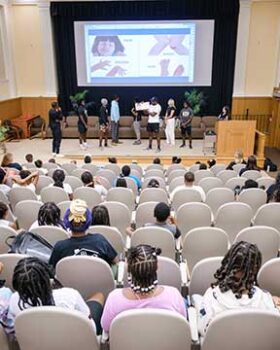Forsyth County students thrive in WFU’s Freedom School
Early research shows program’s impact

HIGHLIGHTS
- This year’s Freedom School will serve K-8 students.
- WFU students, alongside peers from various universities, guide the reading curriculum.
- Research efforts, supported by a $400K grant, measure the program’s impact.
- Preliminary findings show positive outcomes on student literacy and teacher interns.
School is out for many students as summer break kicks in full swing, but that doesn’t mean learning will stop for some Forsyth County students.
Nearly 70 children will embark on a six-week journey of literacy enrichment and college campus immersion at Wake Forest University’s Freedom School.
This year’s program runs from June 17 to July 26.
“We are excited because we are officially bringing back middle school, so this year we will serve students in K-8 grade,” said Camry Wilborn-Mercer, associate director for inclusive excellence in the Office of Diversity and Inclusion and project director of Freedom School.
It’s part of a national initiative developed by the Children’s Defense Fund (CDF). Wake Forest’s Freedom School aims to combat summer learning loss while fostering a deep love for reading.
Six-week program goes beyond academics
These students will not only enhance their literacy skills but also experience the college campus environment firsthand.
“Freedom school in general is amazing because kids get access to books they might have not been exposed to,” said Wilborn-Mercer.
“They get a community who’s encouraging them to read and to make a difference. But I think even beyond that, being able to see yourself on a college campus is super important. ”Camry Wilborn-Mercer, director of WFU’s Freedom School
Each morning kicks off with Harambee, a lively gathering that ignites excitement for the day ahead. It’s filled with music, singing, special recognitions and announcements of the day. Guest readers and speakers from the Forsyth County community also take part in the festivities. Kids then head to classrooms for interactive literacy classes.
Field trips to local attractions include a visit to Kaleideum, an interactive local museum and science center geared toward children, and engaging afternoon activities, including STEM workshops led by high school students from WFU’s LEAP initiative, further enrich the learning experience.
College student interns guide reading curriculum
The heart of the program lies in its servant leader interns (SLIs), comprising students from Wake Forest, Elon, UNCG and Wingate University. These mentors, in classrooms of 10 to 12 students, facilitate the integrated reading curriculum, featuring books that mirror the scholars’ experiences and identities.

“There’s a theory that books should be mirrors and windows, and so part of the curriculum includes books that are culturally responsive,” said Dani Parker Moore, executive director of Freedom School and assistant professor of multicultural education at Wake Forest.
Parker Moore, a driving force behind the program’s inception on campus, reflects on her transformative journey as a student teacher in the program in 2013 to her role today. For her, Freedom School represents more than just a summer camp—it’s a life’s work dedicated to empowering youth through education and civic engagement.
“It just changed me when I was in graduate school,” she said. “I could see children were so excited to come to the summer program. I had never seen anything like that. And then to be in a space where these books were so culturally diverse and so expansive and the kids were asking questions and interacting was just amazing to me, and I just knew that I wanted to do that. And so I have not stopped since.”
Encouraging civic engagement
Beyond academics, Freedom School nurtures social awareness and civic engagement. This year, students nationwide will observe the National Day of Social Action on July 19, centered on the theme of banned books. Through projects like letter-writing campaigns to lawmakers and videos, the youth scholars will champion diversity and representation in literature.
“We will participate with a special activity or display,” said Parker Moore. “The civic engagement component gives kids an opportunity to see how they can get involved and why it’s important. We hope that they are engaged and really excited about this and that the activity shows them they can make a difference in themselves, in their communities, in the nation and in the world with hope, education and action.”
The impact of Freedom School extends beyond the classroom, touching families through parent workshops on self-care, financial literacy and advocacy.
Early research findings and outcomes
Recognizing the collaborative success of the program, Wake Forest was awarded a $400,000 grant from the Spencer Foundation last year. The three-year grant is funding research on Freedom Schools in North and South Carolina, providing valuable insights into the effectiveness of the program’s multicultural curriculum on both students and teachers.
As the program enters its seventh year, organizers are excited to expand their research efforts. Data collection at various Freedom School sites will continue this summer with the help of Wake Forest undergraduate and graduate research assistants.
According to early results and interviews collected after the 2023 Freedom School, the program is already showing an impact on student literacy.
“What we found last summer was that at this site, the students increased instructional reading by 5 months. ”Dani Parker Moore, assistant professor and executive director of Freedom School
“Basically, what that means is when you go back to school in the fall, a teacher is not having to really work on that part of your education because you were engaged in it. The summer slide isn’t an obstacle,” added Parker Moore.
Preliminary findings also show the program’s impact on the student teacher interns. In post interviews, students said the program increased their own understanding of culturally relevant teaching.
“They also found that the experience shaped how they felt about future career opportunities,” said Parker Moore. “They believed that creating meaningful relationships with the scholars, the kids that participate, were key for the success of the summer.”
Providing tools for educators

Moore, a former public school teacher herself, said all of this is important to help give educators as many tools as possible to enhance learning outcomes.
“Partly what we’re doing is we’re hoping that this would even inform teacher training because that’s one of the gaps we find in education is that people feel like they don’t have enough cultural competence, culturally responsive teaching in their toolkit,” she said. “What I’m trying to do with this grant is demonstrate that this training and this immersive experience for six weeks is something we should be looking for and looking towards when we think about training future educators.”
Data collection at various Freedom School sites will continue this summer with the help of Wake Forest undergraduate and graduate research assistants.
Freedom School is hosted by the University’s Department of Education and sponsored by The Office of Civic & Community Engagement, the Office of the President, the Office of the Provost, and Dr. and Mrs. Raymond Clarke.
Student fundraising efforts in the 2023-2024 school year through Project Pumpkin and DESK raised more than $9,000 for Freedom School. The funds are used towards classroom supplies and operating costs.
Media are invited to cover the Harambee session of Freedom School on Tuesday, June 25 and Wednesday, June 26 from 8:30 a.m. to 9:15 a.m. in Carswell Hall on Wake Forest’s Reynolda Campus. Time can also be arranged for literacy classroom activities directly following Harambee. Contact Keri Brown (media@wfu.edu) for a schedule of activities and location information or call 336-758-4442.



